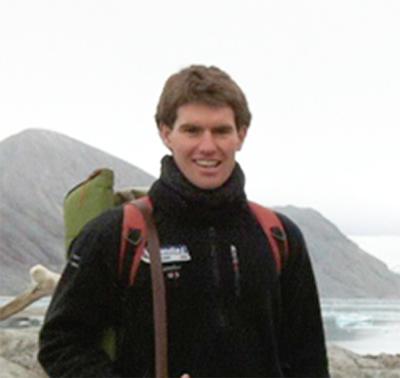Max Holloway MSc Oceanography, 2012
Ice Core Paleoclimatologist, British Antarctic Survey (BAS)

My studies at Southampton completely shaped me as a researcher. The new skills I developed allowed me to secure a NERC funded PhD studentship, based at the British Antarctic Survey and tied with the University of Bristol.
1. What made you choose the degree you studied?
I was part of the British national sailing team and I had become increasingly interested in weather. In sailing, most of my day was spent interpreting patterns in the weather and trying to predict change over short timescales. My undergraduate studies strengthened this interest in the interactions between the surface ocean and atmosphere, and I became fascinated by the science of predicting change on longer timescales of climate. I wanted to continue learning about these systems on ever longer timescales and how we could use this information, about past climate variability, to inform future projections of climate change.
2. What made you select the University of Southampton to study that degree?
I realised that my undergraduate projects would have been more robust if they had included a numerical modelling aspect. I concluded that a combined data-modelling approach would offer substantial insight into my scientific questions. NOCS is renowned for its facilities and teaching of ocean and climate science and I regarded it as the leading centre to learn these skills and in the numerical modelling aspects I was interested in moving towards
3. What did you enjoy most about your degree?
The close community of course mates, the structure of the courses and the engaging course content and lecturers. I remember looking forward to each lecture and the prospect of learning something new everyday.
4. What opportunities did you take up that really added value to your experience as a student?
I was a member of the University cycling club, which was a great way to explore the local countryside in the nearby New Forest and South Downs national parks. I also remember spending weekends in the New Forest, with great course mates, BBQ’s and pubs! The mix of intense courses and fieldwork built up a very close community within the course and close friendships.
5. When you graduated what were your career ambitions?
I wanted to progress to a career in scientific research; I enjoyed research, learning new things each day, and I felt that the flexibility associated with academia would allow me to achieve a sustainable work-life balance.
6. Where are you working now?
I work at the British Antarctic Survey in Cambridge as a postdoctoral researcher. My job title is Ice Core Paleoclimatologist.
7. Tell us about your current role?
I run climate model simulations covering periods of the past and compare this information to paleoclimate archives (such as Antarctic ice cores). I use this information to help understand how climate has varied during the past and therefore inform us on how it might vary in the future. My main interest is in developing novel statistical methods for improved model-data comparison.
8. Do you have any future ambitions?
I would like to progress to a permanent role in a University, performing research that utilizes both models and data in climate, paleoclimate and ocean science and teaching the next generation of climate scientists.
9. What are you most proud of?
I recently published a paper in the journal Nature Communications, which was widely covered in the global press. I felt that this work represented a significant step forward in the field and was the accumulation of roughly 3 years of work during my PhD.
10. What makes your current role unique?
Being based at the British Antarctic Survey (BAS), I am surrounded by inspirational scientists. The standard of scientific output from BAS is very motivating for a young researcher and drives me to produce my best science. Working at BAS also provides unique opportunities for research in the Polar Regions. For example, last September I travelled to Svalbard for a two-week field course, where I learnt how to conduct safe fieldwork in the Polar Regions. The landscape, icebergs and lingering sunsets at 80˚ North were truly unique experiences.
11. What advice would you give to a student starting their degree at Southampton?
Follow the courses that interest you, it makes it a lot easier to keep up with the literature when you enjoy your subject. Also, put in the time before lectures to prepare yourself with the content so you are prepared to get the most out of each hour of teaching time – that way the information is more likely to stick! Also, make the effort to explore outside of Southampton; the New Forest, Lymington, Winchester, Avon Beach and the Isle of Wight are all easily accessibly from Southampton.
12. If you had your time at University again is there anything you would do differently?
I would have made more of an effort to publish the work from my MSc thesis. I think that it was a very interesting result and would have been of interest to the wider scientific community. If I think this of a piece of work I do now then I feel it is important for me to communicate this to the scientific community through the published literature.
13. What tips would you give to current students looking to start a career in your sector?
Don't neglect mathematics and statistics. These are highly sought after skills of growing importance. These skills are discipline independent and provide a common language for communicating between scientific communities; they are the tools for quantifying uncertainty in science.